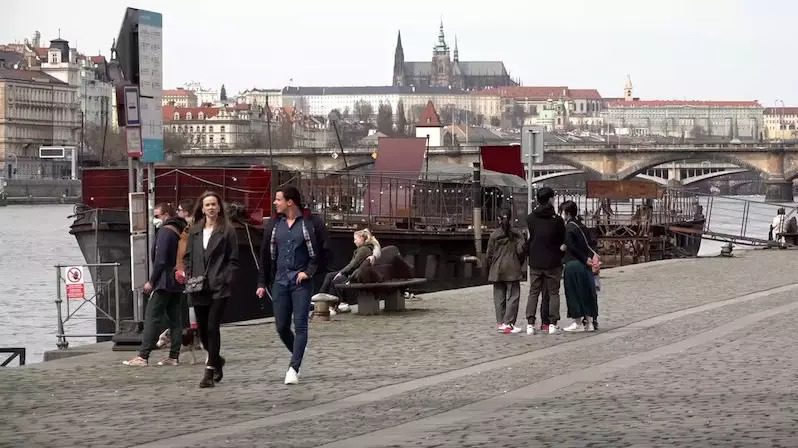A ban on drinking alcohol could be in force on Prague’s embankments from midnight to 9 am. Consumption of alcoholic beverages would not be allowed in about a thousand other places in the capital. The measure could come into force from 1 July.
The amendment to the ordinance was supported by councilors from United Forces for Prague (a coalition of TOP 09 and STAN) and Praha Sobě. In contrast, the coalition Pirates abstained from voting, said Prague Deputy Mayor Petr Hlubuček (STAN).
The city council will decide whether the amendment will enter into force, and it is expected to discuss the proposal at its meeting at the end of May. The ordinance was last amended in 2013.
“Tourists are returning to Prague again and with them some problems with the order, especially in the streets of the city center. The new ordinance aims primarily to protect existing residents as much as possible from noise and disorder around their homes,” Hlubuček said.
If the amended ordinance is approved, the consumption of alcoholic beverages will be restricted on the embankments along with the Dvořák, Rašín, and Masaryk embankments, on the Ludvík Svoboda embankment, and the so-called Smíchov embankment.
The ban should be in force from midnight to 9:00 am. “We want the embankment to have a quiet regime from midnight,” said Councillor Jan Chabr (TOP 09). According to him, the city is responding to the reservations and complaints of residents of Podskalí, where there is usually a bustle until late hours caused mainly by private parties of visitors to the embankment.
There will be about a thousand banned sites
.Drinking alcohol in public will also not be legal in selected squares, parks, and some streets of Prague. So far, there are about 800 locations in the capital, but the new decree will expand the number of places to about 1,000.
Consumption of alcoholic beverages will also not be allowed in playgrounds and near schools and medical facilities.
Alcohol consumption will also be banned within 100 meters of entrances to metro stations and on public transport platforms.
The deputy minister said people would also be penalized if found with an open bottle of alcoholic beverage in selected public spaces. “Till now, it used to be that an officer had to see a person drinking alcohol,” he added.
The ban will not apply on December 31 and January 1 on New Year’s Eve and New Year’s Day celebrations, according to the document. Planned events such as vintage parties, concerts, and sporting events would also be exempt from the ban. If the amendment is approved, the ban would also not apply to drinking alcoholic beverages in the gardens of restaurants and at food stalls.






amoxicillin 500 mg where to buy: doxycyclineca – where can i buy amoxicillin without prec
medicine amoxicillin 500
buying from online mexican pharmacy northern doctors pharmacy pharmacies in mexico that ship to usa
buying prescription drugs in mexico mexican pharmacy northern doctors buying from online mexican pharmacy
mexican online pharmacies prescription drugs northern doctors pharmacy mexican mail order pharmacies
http://northern-doctors.org/# buying prescription drugs in mexico online
pharmacies in mexico that ship to usa: northern doctors pharmacy – mexican pharmaceuticals online
mexican rx online: northern doctors – best online pharmacies in mexico
https://northern-doctors.org/# mexican online pharmacies prescription drugs
https://northern-doctors.org/# medication from mexico pharmacy
mexico drug stores pharmacies: northern doctors – mexican pharmaceuticals online
https://northern-doctors.org/# mexican drugstore online
best online pharmacies in mexico: northern doctors pharmacy – п»їbest mexican online pharmacies
п»їbest mexican online pharmacies mexican northern doctors mexico pharmacies prescription drugs
buying prescription drugs in mexico
http://cmqpharma.com/# mexican border pharmacies shipping to usa
best online pharmacies in mexico
buying prescription drugs in mexico online mexican pharmacy п»їbest mexican online pharmacies
reputable mexican pharmacies online online mexican pharmacy mexico pharmacies prescription drugs
mexican pharmacy mexican pharmacy best online pharmacies in mexico
mexico drug stores pharmacies: mexican mail order pharmacies – mexican online pharmacies prescription drugs
buying prescription drugs in mexico online: reputable mexican pharmacies online – best online pharmacies in mexico
ventolin 2.5 mg: ventolin over the counter canada – buy cheap ventolin online